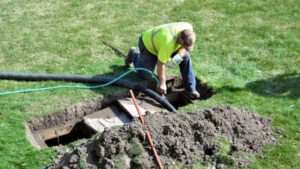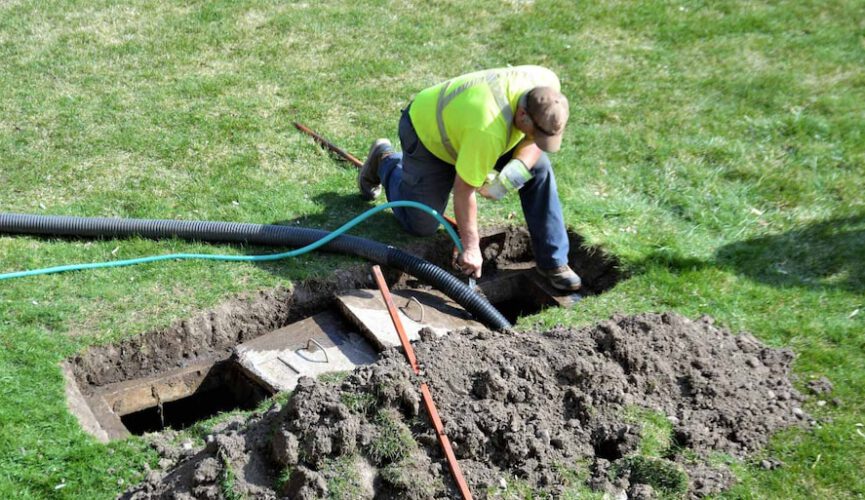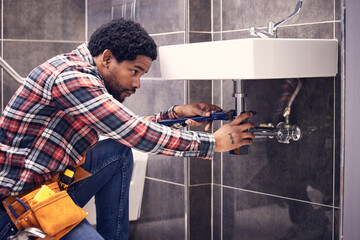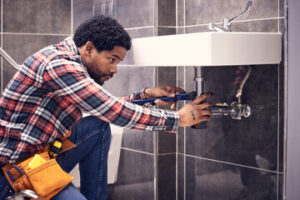Most household waste ends up in your septic tank. It is important to have this tank properly treated and maintained to avoid contamination of groundwater, which can cause diseases in humans and other animals.
The best way to keep your septic tank working correctly is to get it inspected by a service professional regularly. These inspections will include a record of sludge and scum levels. Visit Website to learn more.

If you start to notice that your sinks and toilets are draining more slowly or have a tendency to back up, it may be a sign that your septic system is in trouble. Slow draining and frequent back-ups are a direct result of untreated effluent (liquid waste) from the tank or cesspool entering the soil. This sewage is not only unhealthy for humans, but it can also clog pipes and leach fields and damage the environment around the septic tank.
Leaks can occur from various sources, but one of the most common is a broken or misaligned lid. Sewer gases and water vapor can escape from the tank when the lid is damaged or misaligned, such as on the filter access port or septic tank riser. The odors may be perceptible for only a few minutes, but it is important to determine where the odor is coming from. It could be from the tank itself, from the leach field, or even from a neighbor’s septic system.
A broken baffle can also allow water to escape from the septic tank into the soil. This can occur when a concrete baffle becomes cracked or crumbles over time due to the pressure of gases in the tank. It can also happen if the baffle isn’t sealed correctly to the inflow or outflow pipe, or if it becomes detached.
Another obvious septic tank leak sign is the presence of a strong, foul smell. The odor is a natural byproduct of the anaerobic bacteria breaking down organic waste in the septic system. This process produces hydrogen sulfide and other gasses, including methane. These odors can escape from the system and linger in the house or yard. If you begin to notice these odors, it is important to get the tank and plumbing inspected as soon as possible.
Less obvious signs of a septic tank leak include excessive vegetation growth and wet or soggy soil near the septic tank. Grass or vegetation grows more vigorously in areas where a septic tank has a leak because of the availability of nitrogen and phosphate. This fertilizer helps plants grow more quickly and can cause a dense stand of vegetation that blocks the flow of water to the leach field.
Your home’s septic system is responsible for disposing and even treating the wastewater that is produced inside your house. That means it’s not something that should be ignored or put under the rug – it must be properly cared for, and that includes regular maintenance.
There are several issues that can occur when your septic tank is not regularly repaired or maintained. The most common issue is a clogged drain system that can lead to serious problems within your home. This can include sewage backups, stinky odors, and even dirty water in the shower or sink. Having your septic tank emptied regularly and following the advice of a septic repair technician will help prevent this from happening so that you can enjoy your septic tank for years to come.
Another issue that can arise with your septic system is the collapse of the septic tank itself. Whether this happens due to the weight of too much waste, or simply due to age, it’s an issue that can cause serious plumbing problems. In addition to causing wastewater backups throughout your home, it can also contaminate your well water. If your septic tank is damaged, it’s important to contact an expert plumber right away so that they can inspect the problem and make necessary repairs.
Sometimes, the concrete of your septic tank will deteriorate over time. This is because of gases that build up in the tank that eat away at the concrete surface. This process is most likely to happen above the water line, but it’s still an issue that should be addressed by a professional.
Aside from the deterioration of concrete, other parts of your septic tank may wear down over time, including internal components such as the baffles, motor, and walls of the tank itself. These parts can be replaced by a septic service provider, and they will also inspect your tank to see if the aerator or vent components are worn down.
When a septic tank is leaking, it’s usually because there are tree roots growing inside. They can infiltrate a septic tank from any weak point and clog drain lines, causing them to fail. This can cause sewage to back up into the home, which can be dangerous for humans and pets.
To prevent this, homeowners need to be vigilant about their septic tank maintenance, including regular pumping and the use of a septic system treatment that can slow new root growth. The cost of this will be a fraction of the price to remove a tank full of roots, and it will keep septic tanks and pipes from failing.
Roots will always be pushing through the ground in search of water, and they’ll seek out weak points like cracks in septic tank lids or poor connections between tanks and risers. Once they’re in, they can grow into massive masses that need to be removed using manual or mechanical means.
A common way to get rid of tree roots is by sending a powered sewer auger with a rotating head down a septic pipe. The head has teeth much like a reciprocating saw blade that cut away the roots. This method has the drawback that the roots will start growing again almost immediately, so it’s not a permanent solution.
An even more effective method is to use a plumber’s snake to clear out all the drainpipes that run to the septic tank. This tool can smash up and rip apart most roots, allowing them to pass through the pipe. However, this will take a lot of time and may need to be repeated often.
Another solution is to put down a chemical product that kills roots. This will take a few months to be effective, but it can work well for many homeowners. If this is the route a homeowner chooses, they must be diligent about getting septic tank and septic system treatments on a regular basis so the chemicals can continue working for years to come.
A septic tank collapse is one of the most expensive problems homeowners face with their septic systems. It can be caused by a variety of factors, from a lack of regular pumping to pressure from above ground and the growth of roots into the tank. A septic tank that collapses is not only dangerous to people and pets but can also pose a hazard to the environment because of the sewage it contains.
As wastewater leaves the septic tank, it travels through pipes and into the drain field. These pipes sometimes have to deal with issues like tree roots or an improper slope, and these problems often lead to clogs that require septic system repair.
The most obvious sign that your septic system needs repairs is a wet area in your yard, which is usually accompanied by a foul smell. This is a sign that sewage has made its way into your soil, and it’s best to have the problem fixed by professionals.
If you notice that your septic tank’s water level is lower than it should be, this is another indication of a clog in the pipe between your home and your tank. It’s a good idea to hire a plumber with video line inspection tools to locate and remove the clog.
As with leaking tanks, collapsed septic systems can also be a costly issue to address. This occurs when the walls of the septic tank break down due to pressure from above or the growth of tree roots into the structure. It’s typically caused by an aging or uninsulated tank that doesn’t have the strength to withstand this pressure.
A broken septic tank can also cause sewage to flow into your home, which is obviously an unhealthy situation for everyone in your household. You’ll need to have the tank repaired as soon as possible to prevent sewage from seeping into your house and causing more serious damage.
The last major sign that your septic tank needs repair is effluent backups, which occur when liquid from the septic system backs up into your drain fields. This may be due to a hydraulic overload or simply because the drain field is overloaded with organic solids. If this happens, your septic system will probably need rehabilitation, which may include jetting drain field laterals or using Terralift equipment to break apart the accumulated bio-mat. A septic system is a complex, underground network of pipes and other components. Any one of these issues can affect the function of your entire septic system, and they should be dealt with immediately by professional plumbers.





